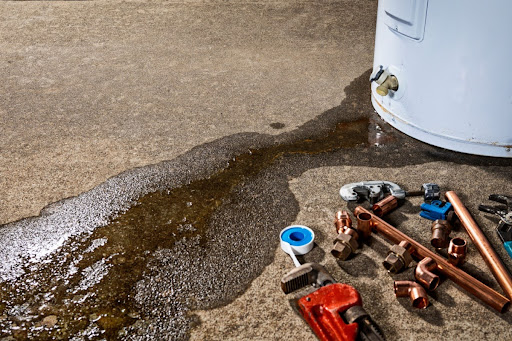Life is full of decisions. Some are small, like what to eat for dinner. Others stick with you for years, like choosing whether to repair or replace a major appliance. If you’re like most homeowners, dealing with a broken water heater might not be at the top of your “fun decisions” list. But when your hot water runs cold, or you’re facing an alarming puddle under the tank, it’s a decision you’ll need to make quickly: repair or replace?
In this blog, we’ll discuss how to determine whether it is better to repair or replace a water heater. By the end, you’ll feel confident about your next steps.
Signs Your Water Heater Needs Attention
Water heaters are one of the most-used appliances in your home. They keep your showers warm, help with laundry, and make dishwashing easier. When something goes wrong, the signs aren’t always subtle:
- No Hot Water: If your water heater isn’t producing hot water, it’s often an issue with the heating element or thermostat.
- Strange Noises: Banging or popping noises could mean sediment buildup in the tank, causing the heater to work harder.
- Water Leaks: Water heater leaks around the tank or drain valve may indicate wear and tear.
- Inconsistent Water Temperature: If your water temperature fluctuates, it could signal a failing thermostat or underlying issues.
- Discolored Water: Rusty or muddy water might mean corrosion inside the tank or problems with the anode rod.
When these warning signs appear, the next step is figuring out whether a simple fix is enough — or if you’re better off with a full replacement.
Is It Better to Repair or Replace a Water Heater?
The big question is always: is it better to repair or replace a water heater? The answer depends on several factors: the age of your unit, the type of issue, and your budget.
How Old Is Your Water Heater?
The average lifespan of residential water heaters is about eight to 12 years. If your unit is close to or past this range, a replacement water heater is often the smarter option. Older units are less efficient, more prone to costly repairs, and may not meet current local building codes.
Cost of Repairs vs. Replacement
Repairs are typically cheaper in the short term, especially for issues like a faulty heating element or a leaky drain valve. However, if the repair cost is more than half the price of a new unit, replacing your water heater makes more sense financially.
Energy Efficiency
Older models are less energy-efficient than modern water heaters. Upgrading to an energy-efficient option like a tankless water heater could save you money on your energy bill in the long run.
Frequency of Breakdowns
If your water heater breaks frequently, those small repairs can add up fast. At this point, replacing your unit may save you time, money, and frustration.
Water Heater Leaks
Leaks around the water heater are a major red flag. A leaky drain valve or pressure relief valve might be repairable, but if the tank itself is leaking, it’s time to start thinking about a replacement water heater.
Common Water Heater Problems and When to Repair
Sometimes, water heater problems can be fixed easily:
- Broken Heating Elements: Replacing a broken heating element is a straightforward repair.
- Sediment Buildup: You can flush the tank to remove sediment buildup and improve water flow.
- Relief Valve Issues: A faulty relief valve is a common issue that can usually be addressed without replacing the entire unit.
- Pilot Light Out (Gas Water Heaters): Relighting the pilot light or fixing the ignition system is often a quick fix.
When Replacement Is the Better Option
If your water heater is old, has extensive corrosion, or you’re noticing persistent water heater leaks, it’s likely time for a new unit. Modern tankless water heaters or models with advanced water heater warranty coverage offer better reliability and efficiency.
Types of Water Heaters: Which One Is Right for You?
If replacing your water heater is the best option, it’s important to choose the right one for your needs:
- Tank Water Heaters: These are the traditional models with a large water heater tank that stores hot water. They’re reliable and cost-effective but take up space and may not be as efficient as other options.
- Tankless Water Heaters: These provide hot water on demand, eliminating the need for a water tank. They’re more energy-efficient and take up less space, though they have a higher upfront cost.
- Electric Water Heaters: Electric water heater models are common and straightforward to install. They’re perfect for homes without access to gas lines.
- Gas Water Heaters: Gas water heater models heat water faster and are generally more cost-effective to operate than electric models.
Why Work With a Reputable Plumber?
Making the call to repair or replace your water heater is easier with professional guidance. At Environment Masters, our skilled plumbers in Jackson, MS, can diagnose the underlying cause of your water heater problems and recommend the best solution. Whether it’s a hot water heater repair or a complete water heater installation, working with an expert helps your system function properly for years to come.
Call Our Water Heater Experts in Jackson, MS, Today!
Still not sure whether to repair or replace? The friendly team at Environment Masters is here to assist you. With decades of experience as trusted plumbers in Jackson, MS, we’ll diagnose the problem and help you decide the best course of action for your home and budget.
Whether it’s a quick hot water heater repair or a full water heater replacement, you can count on us for expert service and honest advice. Schedule an appointment today with our Jackson water heater experts and get back to enjoying reliable hot water in your daily routine!

